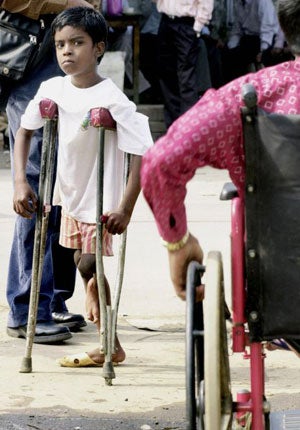Independent Appeal: Fighting a lifetime of prejudice
In Bangladesh, championing the rights of people with disabilities is not easy, but one woman is determined to see justice. Andrew Buncombe reports

When Umme Ranjona was young, her friends would tease her and call her names. Even her brothers and sisters joined in. "Langri", they would call her, Bengali slang for "cripple".
Struck with polio when she was just a year old, Ranjona was left with a disability to her leg that meant she could not join in some of the games the children played.
She determined that the discrimination should go no further. "I could not accept it," she says, guiltily remembering her wish that her tormentors be similarly struck down. "I prayed to Allah that he should make these people disabled so that they would understand the agonies of a disabled person as well."
Today, at 26 years old, Ranjona is still fighting for justice. She is at the forefront of a battle for disability rights in Bangladesh. The movement is still in its infancy. Confronted by widespread prejudice, it is using the courts to demand justice for those who have suffered discrimination and abuse.
Campaigners say that abuse of disabled people is common and horror stories abound of awful, murderous behaviour. Recently a 16-year-old girl called Hashi, suffering from physical and mental disabilities, was gang-raped by a group of men who afterwards poured acid in her mouth so she would be unable to identify them. She was then dumped in the middle of a road in the town of Rajapur. She died from her injuries.
Ranjona was in her final year at school when she learned about a disabled people's self-help group and was asked to join. Her first assignment was to document how many disabled people lived in her village.
"I was concerned that alone I could not do anything but that with others I could do more to help," she says. "We organised to arrange weekly meetings and save money for the group. And we set up committees."
Ranjona and her friends worked to raise awareness about disability rights through various projects including street theatre and drama.
She also started attending meetings of other groups, to learn from their leaders. Soon she found herself elected to leadership positions within her group.
Campaigners say disabled people are often targeted because their tormentors believe they will not have the wherewithal to defend themselves – either while the abuse is taking place or afterwards.
"People take the attitude that if they are mentally or physically disabled they will not go to court or reveal their name," she says. Ranjona is now the president of the National Disabled Women's Council, which is supported by Action on Disability and Development, one of the groups that will benefit from this year's Independent Christmas Appeal.
The aim of such groups is to provide support to people with disabilities so that they can use the courts to counter discrimination. They also liaise with community leaders and local authorities.
Her group does more than that. From a simple office in the city of Bogra, the council has developed projects to provide disabled people with viable incomes.
The projects are simple, involving tasks such as batik printing and sewing, but in a country where a handful of coins can make the difference between going hungry or not – they can prove to be vital.
Bringing about change and shifting attitudes towards people with disabilities is a slow process.
Bangladesh is a desperately poor country suffering a host of economic and environmental problems. It has also suffered from political instability and is just emerging from a two-year period of emergency rule, during which it was under the control of an interim government.
A newly elected government led by the former prime minister Sheikh Hasina will be sworn in today.
Life expectancy in Bangladesh is 63 years and less than 50 per cent of adults are literate. While the national economy has been growing by about 6 or 7 per cent a year, a huge proportion of the population live in poverty. It is against this backdrop of other competing priorities that campaigners such as Ranjona are striving to make their voices heard.
Yet if she ever wonders about the value of the work that she is doing, she need do nothing more than think of Hashi, the 16-year-old girl who was raped and murdered.
"When I hear of such violations, I know I have to raise my voice against them," says Ranjona.
"The demand of justice is our constant right."
Subscribe to Independent Premium to bookmark this article
Want to bookmark your favourite articles and stories to read or reference later? Start your Independent Premium subscription today.

Join our commenting forum
Join thought-provoking conversations, follow other Independent readers and see their replies